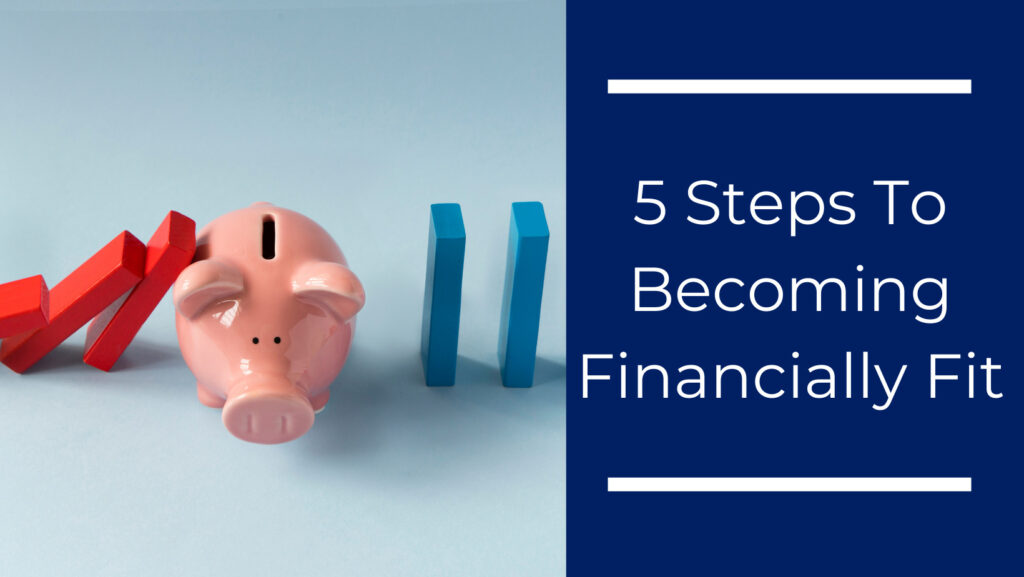First of all, what does it mean to be financially fit and why is that important? Being financially fit is
understanding your current financial situation, setting goals for the future and having confidence in your
ability to make financial decisions (even if that’s with the help of a trusted financial professional). Being
financially fit will increase your health as it reduces stress and anxiety, and empowers you to make smarter
decisions that have a positive impact in all areas of your life. Follow these five steps to get started:
- Pay attention to Cash Flow: Spend less than you earn. Easier said than done sometimes, but critically
important. Awareness is the secret to success in this area. Can you answer these questions? What is
your total monthly net income (net meaning what actually shows up in your bank account each
month)? That is the easy question, the harder one to answer is: what are your monthly expenses? It is
important to include everything here, but that can be overwhelming as there are many one-time
expenses that go un-noticed. To keep it simple, I suggest completing a cash flow worksheet
(available at www.thewealthylife.com ). This will help you list all the regular expenses you incur each
month. There are a few annual expenses that also need to be accounted for (ie. property taxes),
so divide that number by 12 and ensure you put that money aside each month so you are prepared
when it's time to pay the annual bill. The process of looking at incoming versus outgoing cash
each month is an eye-opener for many. Be intentional with your spending! If you have a
shortfall, you need to look hard at your spending patterns and see what you can cut back on.
There are only 3 ways to fix a cash flow shortage: 1) earn more money 2) spend less or 3) a
combination of 1 & 2. - Calculate your Net Worth: Put together a list of all your assets (ie. investment accounts, savings, house,
etc). Next put together a list of your liabilities (credit card balances, mortgage balance, line of credit
balance, etc). When listing your liabilities, you want to put down the total amount owing, not your
monthly payments as that should be listed above under cash flow. Subtract your total liabilities from
your total assets and you have your net worth. This number is meaningless without knowing what you
need it for, which takes us to step 3. - Set Goals: What do you want to accomplish? Think big! If you don't set a goal, you are unlikely to
achieve it. Most people want to pay off debt and save for the future, which is great, but I suggest
being more specific. If retirement savings is your goal, you need to decide at what age and how much
income per year do you want. Work with a financial planner or advisor to help brainstorm goals and
build a plan to achieve the specific goals you desire. Need a little inspiration? Start by asking yourself
what you would do it you won the lottery. You’d be surprised at how many of those goals can be
achieved, at least a modified version of, without needing to win the lottery.
5 Steps to Becoming
Financially Fit - Invest Wisely: Do you know what your investment options are? There is a big difference between
GICs and stocks, mutual funds and ETFs. There are pros and cons to each type of investment, not to
mention varying levels of risk and opportunity. Take the time to learn the basics so you can make
better investment decisions and understand how those decisions impact your life goals. For example,
a GIC is safe since your capital is guaranteed, but the interest rate is extremely low and doesn't keep
up with taxes and inflation, so will do little to help you achieve your long term goals. Stocks come in
many different risk categories, don't offer guarantees, but do have higher return potential than
GICs and provide a better chance of achieving long term goals. Educate yourself on the various
options so you can make informed decisions that will support your goals. - Protect your family: Have you planned for the unexpected? What would the impact be if you were
unable to work? What about if you were no longer here at all? Would there be a burden left behind
or have you put a plan in place to take care of loved ones? Will Revenue Canada be the beneficiary of
your estate? It’s important to look at the impact from potential scenarios to ensure you’ve got the
coverage in place to protect your family and preserve your wealth.
People tend to stress over money and finances, therefore put off looking at it. It's not as complicated as
people think. Work with a professional to help simplify your finances and help you feel in control of them.
Being in control is nothing more than having an awareness of your financial situation and taking action to
achieve your goals. Follow the above and you'll be financially fit in no time. The rewards are great, what
are you waiting for?
